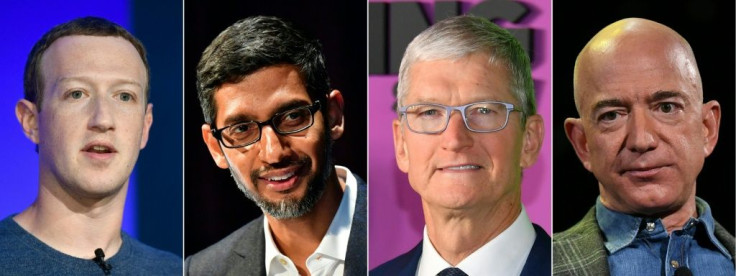Big Tech On Capitol Hill: Here’s What the CEOs of Google, Amazon, Apple and Facebook Will Tell Congress
KEY POINTS
- The four CEOs are set to appear before the House Subcommittee on Antitrust, Commercial and Administrative Law on Wednesday
- Each CEO will offer arguments against any potential changes to trust laws that could stiffle growth for Silicon Valley going forward
- The CEOs speak about how each has helped encourage growth within their respective spaces online, whether it be online retail in regards to Amazon or Google helping drive down online ad prices
The head-honchos of Alphabet, Facebook, Amazon, and Apple are set to appear on Capitol Hill Wednesday as part of the latest round of hearings before the House Subcommittee on Antitrust, Commercial and Administrative Law as to whether antitrust laws need to be changed to account for the growth of big tech. Each released statements Tuesday night about what they will say. Some excerpts:
Alphabet CEO Sundar Pichai will argue the Google hasn’t hampered competition, but instead fostered it. He points to the drop in ad prices over the last decade thanks, in part, to the wide availability of free Google services like Search and Gmail.
“A competitive digital ad marketplace gives publishers and advertisers, and therefore consumers, an enormous amount of choice,” Pichai said in his prepared statement. “For example, competition in ads — from Twitter, Instagram, Pinterest, Comcast and others — has helped lower online advertising costs by 40% over the last 10 years, with these savings passed down to consumers through lower prices.”
Pichai argues it’s also these services that reflect Google’s reinvestment into the U.S. This is reflected in the reinvestment into various U.S. communities through new offices and data centers, or how businesses have been able to rely on these free services during the coronavirus pandemic.
“PPI estimated that in 2018 alone we invested more than $20 billion across the U.S., citing us as the largest capital investor in America that year,” Pichai said. “It’s also ranked us in the top five U.S. investors for the last three years.”
Amazon CEO Jeff Bezos may have a harder hill to climb because of the sheer size the company has grown to. However, he will argue its size is beneficial to the marketplace because there are “things small companies simply can’t do.” He will also argue Amazon’s digital marketplace is an invaluable resource for various small businesses trying to grow in the online retail market while facing regular competition from retailers like Target, Costco, and Walmart.
“These small and medium-sized third-party businesses now add significantly more product selection to Amazon's stores than Amazon's own retail operation,” Bezos said in his prepared statement. “Third-party sales now account for approximately 60% of physical product sales on Amazon, and those sales are growing faster than Amazon’s own retail sales.”
Facebook’s Mark Zuckerberg will argue the value the social media platform has not only for free expression, but as one beneficial for business connectivity and use. When speaking about the former, Zuckerberg says Facebook provides the tools small businesses and entrepreneurs need to begin connecting people to their business and growing in a meaningful fashion, fostering competition under current U.S. laws.
“Facebook supports its mission of connecting people around the world by selling ads, and we face significant competition,” Zuckerberg said in his statement. “We compete against the companies appearing at this hearing, plus many others that sell advertising and connect people. We also compete globally, including against companies that have access to markets that we aren’t in.”
Lastly, Apple CEO Tim Cook will look to argue the company doesn’t hold “a dominant market share” within the markets the company competes in. One example he cites is how the App Store follows a “department store” model and provides high-quality apps, leading to Google and Microsoft releasing their own app markets to compete. The second example he provides is the selection of smartphones available as alternatives from the Apple iPhone from competitors like Samsung, Google, and LG.
“We focus ceaselessly on our users and their experience, and we see the iPhone’s 99% satisfaction rating in consumer surveys as not only a key driver of the product’s growth over time, but also our best measure today that we are still on the right track,” Cook said in his opening statement. “As much as we believe the iPhone provides the best user experience, we know it is far from the only choice available to consumers.”
“The smartphone market is fiercely competitive, and companies like Samsung, LG, Huawei and Google have built very successful smartphone businesses offering different approaches.”
It remains to be seen if these arguments will be enough to sway Congress from proposing new laws that could hamper the continued growth of these tech giants.

© Copyright IBTimes 2024. All rights reserved.





















